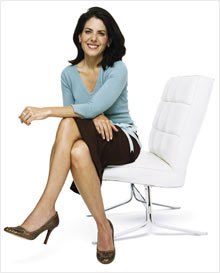Live to 100 - and pay for it
Scientists say hitting the big 1-0-0 is a real possibility for many of us. That'll be expensive.
 |
| Editor-at-large Jean Chatzky appears regularly on NBC's Today. Contact her at money_life@moneymail.com. |
(Money Magazine) -- Barbara Walters has me on edge.
It's not the level of detail, complete with famous bedmates, in her best-selling memoir. It's her recent ABC special: Live to Be 150...Can You Do It?
"No," I harrumphed. "And by the way, I wouldn't want to." Turns out I'm not alone; according to an ABC News poll, nearly three-quarters of Americans aren't at all sure they want to hit the triple digits.
Great medical minds, however, have other ideas. You can hardly open the newspaper without seeing a story about some new Grim Reaper-repelling discovery.
To cite just one piece of research: In June a study funded by the National Institutes of Health and conducted by the Autonomous University of Madrid found that drinking two to three cups of coffee a day cut women's chances of dying from heart disease by 25%.
Mind you, my reluctance to hang around for more than 10 decades isn't because I lack a role model. My grandfather was going strong until he died in his sleep at 98. But I've also seen the other side of the equation. I watched my father suffer through the heart disease that took his life at 71.
And so I worry about many of the same things as the poll respondents: losing my health (73%), losing my mental abilities (69%) and running out of money (60%). Particularly running out of money.
That's a possibility that Neal E. Cutler, a leading financial gerontologist (an expert on the intersection of money and aging), has been stewing over as well. He thinks it's high time we all stop talking about retirement planning and start talking about longevity planning.
"Retirement planning is so 20th century," says Cutler, who runs the Center on Aging at the Motion Picture and Television Fund. "Some of us may not ever retire - so how do you plan for that? What we should be planning for is living longer."
How much longer, exactly? That's a good question. Sure, you can look at the averages. But these days you can get a much more customized projection. Just do a Web search for a longevity calculator. I chose one by professors at the University of Pennsylvania's Wharton School.
Answer a few questions and out pops a number that's supposed to be the age at which you'll begin occupying an urn. The questions, which cover everything from your exercise habits to the number of sexual partners you had this year, are a little surprising.
You'll find that wearing seat belts consistently is a good thing. Being married, not so much - if you're a woman, anyway. (Turns out that having a spouse adds longevity only if you're a man. What's up with that?)
So how many years do I get, according to the calculator? Eighty-six. I'm fine with that. Which again makes me pretty much like most Americans. The ABC poll homed in on 87 as the perfect life span.
Had I left the analysis there, however, I would have made a huge error, says Wharton's Lyle Ungar. He should know: He co-wrote the calculator. "What that is saying is that the average person with your demographics will live to be that age if nothing changes in science. That's unbelievably misleading. You and I are not the average person. And assuming no progress in science is obviously insane."
In fact, if you're reading this magazine, you're likely above average. Why? Because you have enough money to see good doctors and eat nutritious food. So, Ungar advises, don't look at the number. Look at the top end of the range that brackets the number (the calculator spits that out too). That moves me into my mid-nineties. Then, he says, plan for that. Where do you start?
I'm very comfy in my postmodern colonial, with its upstairs loft and finished basement. When I'm 65, though, the two sets of stairs that get me to those floors might be a problem.
Not that I think this house is the last one I'll live in. But Cutler says my next house probably will be. In choosing it I should consider things like easy access to public transportation that become more important as driving skills ebb with age. "These sorts of considerations may not be part of retirement planning, but they are part of longevity planning," he says.
If I'm still healthy in my seventies and beyond, I'll probably not only be traveling, I'll be working; I can't see ever really stopping. Which means that although I likely will be earning income for longer, I'll also be spending just as much (inflation-adjusted) as I do now.
And the walls will still need painting, the carpets cleaning, the refrigerator and other appliances replacing. At age 93 I will not - I promise you - be doing that work myself. And then there's the huge cost of health care.
But once you know how much you spend on an annual basis and how many years you can safely plan to live, it's fairly simple to plug that information into our retirement calculator and figure out whether you'll outlast your money.
You know the old rule that you should subtract your age from 100 - and that's the percentage of your portfolio to keep in stocks? Well, if at 80 you're looking at 20 more years of life, you'll sure want to have more growth going on than you could get from a measly 20% in equities.
Maybe 120 minus your age is a better target. Also, the longer you live, the bigger a concern inflation is, points out Harold Evensky, a financial planner in Coral Gables, Fla. He therefore has 15% to 30% of his clients' fixed-income allocation in TIPS (Treasury Inflation-Protected Securities).
It's hard to put your own needs before those of your parents and children. But your retirement funds and your health care take precedence over even other important financial needs, like college - especially as you may face more years than you currently expect.
And gifting money to kids or grandkids? There was a time when doing that was standard advice. But today you can forget about gifting unless you're sure your own needs are covered until you're 100 years old. Maybe we should make that 105.
Do you (and your spouse) make more than $170,000 annually and worry about tax-efficient retirement planning? If so, send your name, age, occupation, income and questions, along with a recent photo, to makeover@moneymail.com. We will be providing advice to a family in this situation in an upcoming article - and it could be you! ![]()




